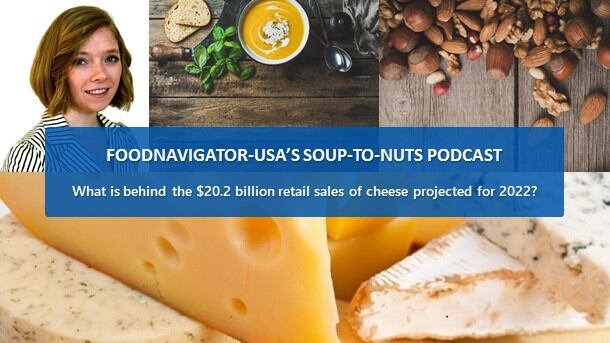According to a new report from consumer research group Packaged Facts, Americans ate 12 billion pounds of natural cheese last year, and are expected to eat 13 billion pounds in 2022, representing a 1.5% annual growth over five years.
This translates to $17.5 billion in retail sales in the US of natural and specialty cheeses last year, according to the report, which projects sales will climb at a 2.9% compound annual growth rate to $20.2 billion by 2022.
Much of this growth is being driven by Americans' changing perception of cheese as nutritious rather than indulgent as well as innovative manufacturers that are introducing consumers to a wider variety of cheeses and more affordable prices as well as formats that are more convenient and snackable. Growing up alongside dairy-cheese is an increasing demand, and availability of, plant-based options, which are gaining popularity beyond vegans as the quality improves.
In this episode of FoodNavigator-USA’s Soup-To-Nuts podcast, we take a closer look at how manufacturers are rising to meet consumers demand for cheese by launching new snacking formats, expanded varieties, more convenient packaging and higher quality plant-based options.
Snack formats
On the snacking front, manufacturers are driving sales of cheese with new cuts, single-serve packages and innovative formats that take the product from fresh to shelf-stable without compromising the ingredient deck or cheese's natural standing.
BelGioioso Cheese Inc. was an early mover in the cheese snacking space, where it has seen wild success that is fueling ongoing innovation, according to marketing manager Jamie Wichlacz.
“We started with the snacking trend maybe about three or four years ago, and the first snacking cheese we came out with was our fresh mozzarella” that comes in three bite-sized balls that offer a “fresh milky flavor,” but can be frozen and tossed in a lunch bag for cool mid-day snack, she said.
Based on the success of that product, the company is adding different cheese options that can be enjoyed on the go or provide portion control for addition to soups and salads, Wichlacz said. She also noted that the company is launching a line of single-serve ricotta that will go head to head with cups of yogurt.
In addition, BelGioioso is introducing accompaniments, such as flatbreads, that will better showcase some of its lesser known cheeses and create new usage occasions, such as an appetizer.
While BelGioioso has pushed cheese more firmly into the snacking, it has remained fairly loyal to the food’s natural state – favoring packaging and cuts to create on-the-go options. But relative newcomer NutraDried Food Company has taken cheese to the far other end of the snack spectrum by “crunchifying” it and creating a near overnight success with the brand Moon Cheese.
Vice President of Sales and Marketing Alan Whitteker explains Moon Cheese is 100% natural cheese that has been cubed and “puffed” into crunchy bites that “look a little like a they could be moon rocks or moon pebbles … and everyone knows the moon is made out of cheese, right?”
The crunchy cheese has taken off in part because it is positioned as a healthy snack that fits within the parameters of many trendy diets in a way that other products don’t – but that positioning was initially clear to consumers and Whitteker said had to be clarified in order to gain sales.
NutraDried Foods not only is scaling up production of its classic Moon Cheese, but it also is innovating in ways that will take the cheese to adjacent categories. For example, it is creating a line of soup and salad toppers that can be placed in the produce aisle and a line of Moon Cheese Mix-Ins that will blend other puffed and crunchified ingredients with the cheese, such as sun-dried tomatoes.
Demand for plant-based cheese rises alongside dairy-based
As dairy cheese consumption continues to climb, so too is demand for plant-based alternatives that don’t sacrifice flavor or function.
One manufacturer stepping up to meet this demand is Good Planet Foods. CEO David Israel explained that the demand for plant-based cheese alternatives is “bigger than anybody can keep up with right now,” and for a much broader audience than originally anticipated.
He explained that originally he thought his plant-based cheeses would be mainly for vegans, but he quickly realized that some consumers wanted plant based because they are lactose intolerant, keep kosher and want a cheeseburger or are concerned about the environmental impact of animal agriculture.
“There are a lot of dimensions in this category,” and Good Planet Foods is prepared to meet them with a wide variety of products that are allergen-free because they use coconut oil as the base instead of more popular options, such as soy or nuts.
Another brand that launched earlier this summer into the plant-based cheese space is Wellny, which a company spokeswoman explained at the Summer Fancy Food Show in New York City isa clean-label alternative to many other non-dairy cheeses.
The brand mimics fresh mozzarella for flavor and texture by blending potato and chicory root for a product that melts and tastes fresh.
Future drivers to watch
Whether plant- or dairy-based, consumers want cheese that is natural and clean, according to several company representatives. The research from Packaged Facts reiterates this, noting that sales of processed cheese are at a mere $4 billion and declining.
Looking forward, Packaged Facts reports other drivers of natural cheese sales will be the addition of bold flavors, including spices, peppers and smokiness. In addition, products marketed as artisanal, ethnic, aging and requiring specialty handling will do well.
The report also sees particular potential with better-for-you cheeses that emphasize freshness, organic and healthier milk bases – such as grass fed and free of artificial hormones.

